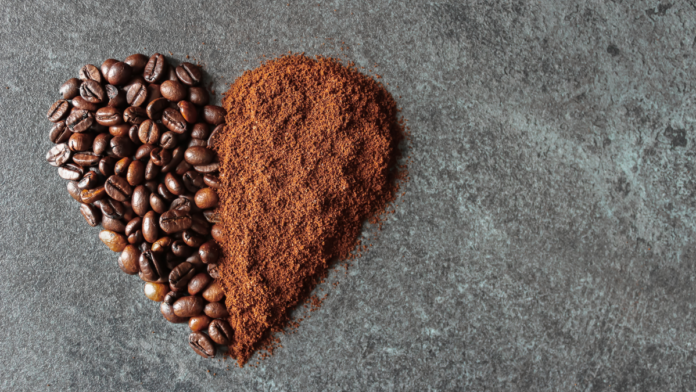You’re sipping your morning coffee, enjoying the rich aroma and that perfect blend of flavors. Suddenly, a question comes to your mind: Are coffee grounds good for plants?
Surely some of you didn’t know that those used coffee grounds could be a secret weapon for your garden. Yes, that’s right! Coffee grounds aren’t just for your cup; they can also work wonders for your plants.
HTC News will take you on a different coffee experience as we dig deeper into our article. Let’s go.

Why Coffee Grounds Are a Gardener’s Best Friend
First off, let’s talk about the science behind it. Coffee grounds are abundant in nitrogen, a crucial nutrient that plants need to thrive. They also contain other essential minerals like potassium, phosphorus, and magnesium. This nutrient-packed profile makes coffee grounds an excellent natural fertilizer. So, if you’re wondering, are coffee grounds good for plants? It’s a big yes.
But there’s more! Coffee grounds help improve soil structure. They break down and create humus, enhancing the soil’s ability to retain water and nutrients. Plus, they can attract earthworms, which are fantastic for your garden’s health.
What are the Benefits of Coffee Grounds for Your Plants?
Let’s break down the specific benefits coffee grounds can offer your plants.
Natural Fertilizer
Coffee grounds provide a slow-release nitrogen source, perfect for leafy greens and other nitrogen-loving plants. Instead of a quick hit that might burn your plants, coffee grounds break down slowly, offering a steady nutrient supply over time.
Improved Soil Structure
As mentioned earlier, coffee grounds help improve soil structure. When mixed with soil, they create a crumbly texture that allows roots to grow freely. This is especially beneficial for heavy clay soils that can become compacted.
Attracting Earthworms
Earthworms are nature’s tillers. They move through the soil, aerating it and breaking down organic matter. Coffee grounds can attract these helpful critters, boosting soil health and plant growth.
Pest Deterrent
While coffee grounds are a treat for your plants, they can deter pests like slugs and snails. The grounds are abrasive, and the caffeine can be toxic to these pests. Sprinkle a ring of coffee grounds around plants prone to slug and snail attacks to keep them at bay.
How to Use Coffee Grounds in Your Garden
Now that you know the benefits, let’s learn how to use coffee grounds effectively.
Composting with Coffee Grounds
One of the best ways to use coffee grounds is by mixing them with your compost pile. They’re considered a “green” material, meaning they’re nitrogen-rich. Balance them with “brown” composts like dried leaves or cardboard for the perfect compost mix.
Mulching
You can use coffee grounds as mulch, but with a caveat: don’t apply them too thickly. A thin layer mixed with other organic mulches can help maintain moisture and suppress weeds, but too much can create a water-resistant barrier.
Direct Application
You can also sprinkle coffee grounds directly around your plants. Mix them into the top layer of soil to avoid clumping. This method is beneficial for acid-loving plants like blueberries and azaleas.
Making Liquid Fertilizer
Did you know you can make a nutrient-rich liquid fertilizer with coffee grounds? Simply steep a cup of used coffee grounds in a gallon of water for a few days. Strain the mixture and use it to water your plants. It’s like giving them a refreshing cup of coffee!
Plants That Love Coffee Grounds
Not all plants react the same way to coffee grounds. Here are a few that particularly benefit:
Acid-Loving Plants
Plants like azaleas, blueberries, and rhododendrons thrive in acidic soil. Coffee grounds can help lower the pH level, creating the perfect environment for these plants.
Leafy Greens
Spinach, lettuce, and other leafy greens benefit from the nitrogen boost coffee grounds provide. You’ll see lusher, more vigorous growth.
Root Vegetables
Root veggies like carrots and radishes enjoy the improved soil structure that coffee grounds create. Just be sure to mix the grounds well into the soil.
When Can Coffee Grounds Become a Problem?
While coffee grounds offer many benefits, they’re not a one-size-fits-all solution. Here are a few situations where you might want to think twice:
Over-Acidity
If your soil is already acidic, adding more coffee grounds might tip the balance too far. Always test your soil pH before adding enormous amounts of coffee grounds.
Mold Growth
Coffee grounds can develop mold if they remain too moist. This is usually okay, but it can be unsightly. Mixing them into the soil helps prevent this issue.
Heavy Applications
Too many coffee grounds can lead to compaction, reducing soil aeration. Always mix them with other materials, and avoid thick layers.
(more HTC News General Topics)
How Often Should You Use Coffee Grounds?
Moderation is key. Too much of a good thing can backfire. A weekly sprinkle around your plants or a monthly addition to your compost should do the trick. Keep an eye on your plants and adjust as necessary.
Starbucks Coffee Grounds for Plants
Did you know Starbucks offers free coffee grounds for your garden? Many Starbucks locations participate in the “Grounds for Your Garden” program, providing used coffee grounds to customers for free. This resourcefulness not only helps reduce waste but also offers a fantastic opportunity for gardeners to enrich their soil.
How to Get Starbucks Coffee Grounds
Simply visit your local Starbucks and ask if they have any used coffee grounds available. They often come pre-packaged and ready for you to take home. Availability may vary, so it’s a good idea to call ahead or check with your barista.
Verdict: Are Coffee Grounds Good for Plants?
Absolutely! When used in the right way, coffee grounds can be a fantastic inclusion to your gardening routine. They’re a natural, sustainable way to enrich your soil and boost plant health. Just remember to use them in moderation and monitor your plants’ responses.
So next time you finish your cup of joe, think twice before tossing those grounds. Your plants will thank you! Happy gardening!
Frequently Asked Questions about Using Coffee Grounds for Plants
Can I use fresh coffee grounds directly on my plants?
Fresh coffee grounds are highly acidic and might be too intense for most plants. Using used coffee grounds is better, as they are less acidic and more beneficial.
How often should I add coffee grounds to my compost?
You can mix coffee grounds to your compost pile once a week. For best results, balance them with brown materials like leaves or straw.
Which plants should I avoid using coffee grounds on?
Coffee grounds should be avoided on plants that prefer alkaline soil, such as tomatoes, lavender, and certain herbs.
Do coffee grounds attract pests?
No, coffee grounds actually repel some pests, like slugs and snails. However, they might attract earthworms, which are beneficial for your garden.
Can coffee grounds harm my plants?
In excess, coffee grounds can compact the soil and lead to poor aeration. Use them sparingly and mix well with soil or compost.
How do I store used coffee grounds?
Store used coffee grounds in an airtight canister to prevent mold growth until you’re ready to use them.
Is it okay to use coffee grounds on indoor plants?
Yes, you can, but do so sparingly and mix them well into the soil.
Can coffee grounds change the pH of my soil?
Yes, coffee grounds can make soil more acidic. This is great for acid-loving plants but may only be suitable for some plants.
How can I make liquid fertilizer with coffee grounds?
Steep a cup of used coffee grounds in a gallon of water for a few days, strain the mixture, and use it to water your plants.
Are there any plants that benefit particularly from coffee grounds?
Yes, acid-loving plants like blueberries, azaleas, and rhododendrons thrive with the addition of coffee grounds.
read more: Where Sports Betting Is Legal: A 2024 Guide for Safe and Legal Gambling
























